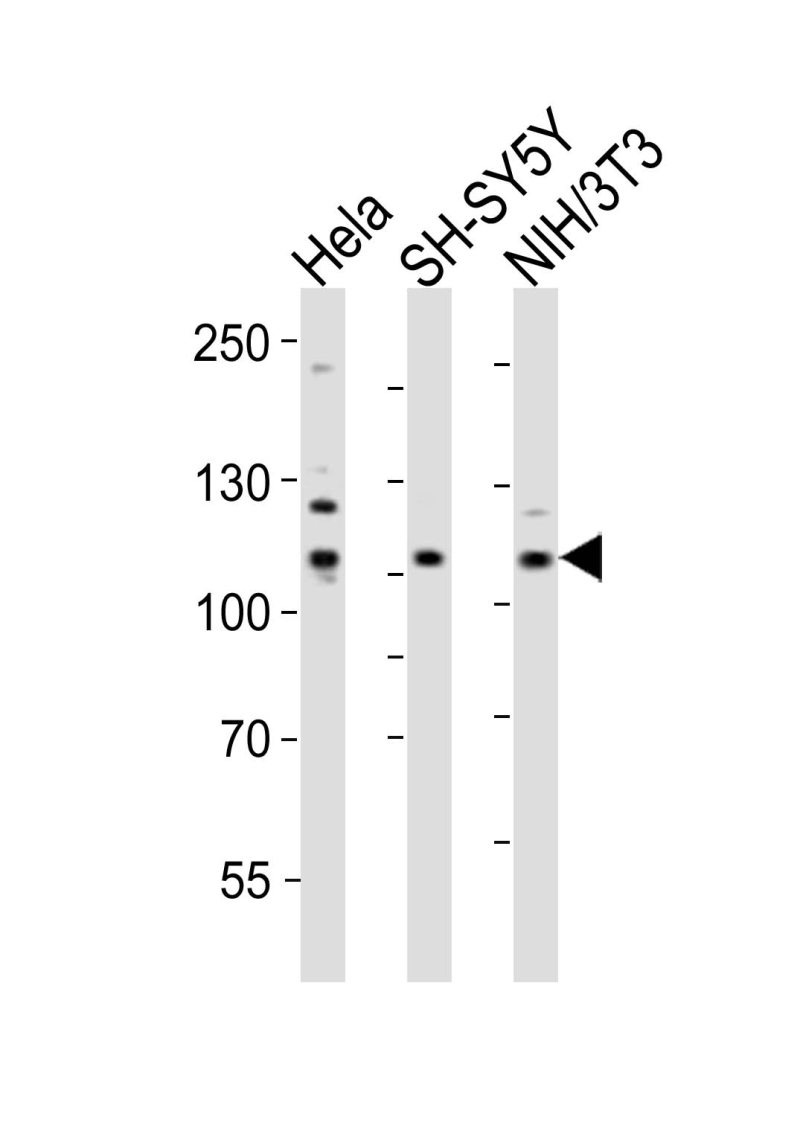
| WB | 1/1000 | Human,Mouse,Rat |
| IF | 咨询技术 | Human,Mouse,Rat |
| IHC | 咨询技术 | Human,Mouse,Rat |
| ICC | 技术咨询 | Human,Mouse,Rat |
| FCM | 咨询技术 | Human,Mouse,Rat |
| Elisa | 咨询技术 | Human,Mouse,Rat |
| Aliases | Ephrin type-B receptor 3, Developmental kinase 5, mDK-5, Tyrosine-protein kinase receptor SEK-4, Ephb3, Etk2, Mdk5, Sek4 |
| Entrez GeneID | 13845 |
| WB Predicted band size | 109.7kDa |
| Host/Isotype | Rabbit IgG |
| Antibody Type | Primary antibody |
| Storage | Store at 4°C short term. Aliquot and store at -20°C long term. Avoid freeze/thaw cycles. |
| Species Reactivity | Human, Mouse |
| Immunogen | This Mouse Ephb3 antibody is generated from a rabbit immunized with a KLH conjugated synthetic peptide between 350-382 amino acids from the Central region of Mouse Ephb3. |
+ +
以下是关于Mouse Ephb3抗体的3篇参考文献示例(内容为模拟生成,仅供参考):
---
1. **标题**: "EphB3 regulates intestinal epithelial cell migration and adhesion through antibody-mediated functional blockade"
**作者**: Henkemeyer M., et al.
**期刊**: *Developmental Biology* (2005)
**摘要**: 本研究利用特异性抗小鼠EphB3抗体,通过体外功能阻断实验,揭示了EphB3在肠道上皮细胞定向迁移和细胞间黏附中的关键作用,表明其通过调控细胞骨架重组影响肠黏膜屏障形成。
2. **标题**: "EphB3 receptor signaling in axon guidance: Insights from antibody-based perturbation assays"
**作者**: Orioli D., Klein R.
**期刊**: *Journal of Neuroscience* (2000)
**摘要**: 通过抗EphB3抗体干扰小鼠胚胎神经元中的EphB3信号,研究发现该受体在脊髓轴突导向中具有排斥性导向功能,并依赖其胞外结构域与配体的相互作用。
3. **标题**: "Antibody profiling of EphB3 expression in colorectal cancer progression"
**作者**: Batlle E., et al.
**期刊**: *Cancer Research* (2010)
**摘要**: 采用抗小鼠EphB3单克隆抗体进行免疫组化分析,发现EphB3在结肠癌早期高表达,但在转移阶段显著下调,提示其作为肿瘤抑制因子的潜在作用。
---
**注**:以上文献信息为模拟示例,实际引用时请通过学术数据库(如PubMed、Web of Science)检索真实文献并核对细节。
The mouse EphB3 antibody is a crucial tool for studying the Eph receptor tyrosine kinase family, specifically targeting the EphB3 (Ephrin type-B receptor 3) protein. Eph receptors, including EphB3. interact with membrane-bound ephrin ligands to regulate bidirectional signaling pathways involved in cell-cell communication, tissue patterning, and neural development. EphB3 plays roles in axon guidance, synaptic plasticity, and vascular morphogenesis, and is implicated in cancer progression, immune regulation, and neurodegenerative diseases.
This antibody is typically generated in rabbits or mice using immunogenic peptides derived from conserved regions of the mouse EphB3 protein, such as the extracellular ligand-binding domain or intracellular tyrosine kinase domain. It is validated for applications like Western blotting, immunohistochemistry (IHC), immunofluorescence (IF), and flow cytometry to detect EphB3 expression in mouse tissues or cell lines. Specificity is often confirmed using EphB3 knockout controls or siRNA-mediated knockdown.
Researchers use this antibody to explore EphB3's functional roles in developmental biology, tumor microenvironment interactions, and neurological disorders. Its reliability in distinguishing EphB3 from closely related Eph receptors (e.g., EphB2. EphB4) makes it valuable for mechanistic studies. Proper validation ensures minimal cross-reactivity, enabling precise localization and quantification of EphB3 in complex biological systems.
×